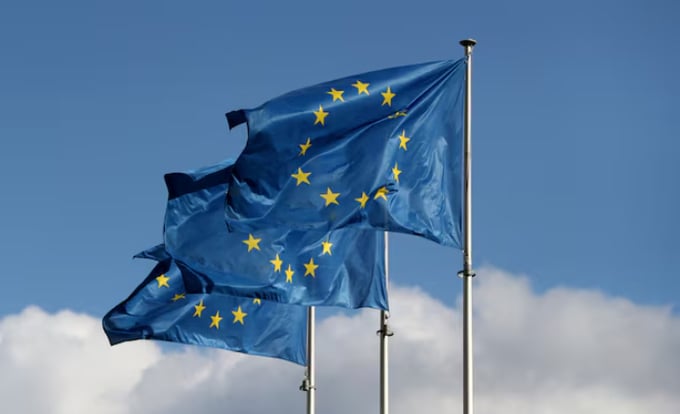December 31, 2025 | 21:05 GMT +7
December 31, 2025 | 21:05 GMT +7
Hotline: 0913.378.918
December 31, 2025 | 21:05 GMT +7
Hotline: 0913.378.918

European Union flags fly outside the EU Commission headquarters in Brussels, Belgium September 19, 2019. REUTERS/Yves Herman/File Photo Purchase Licensing Rights.
U.S. President Donald Trump on Sunday shrugged off an earlier report of the EU plans from the Financial Times, which cited unnamed EU officials as saying they would present the idea this week.
A draft of the EU's "Vision for Agriculture and Food" policy document, due to be published on Wednesday and seen by Reuters, confirmed the Commission would take a tougher line on imports to ensure a fair level playing field for Europe's farmers.
"The Commission will pursue, in line with international rules, a stronger alignment of production standards applied to imported products, notably on pesticides and animal welfare," said the draft.
"The Commission will ensure that the most hazardous pesticides banned in the EU for health and environmental reasons are not allowed back into the EU through imported products."
The draft, which did not specify which pesticides were the most hazardous, could still change before it is published.
The EU move could block imports of U.S. soybeans and other foods treated with pesticides not used by European farmers.
A European Commission spokesperson declined to comment on the leaked draft document.
Trump said on Sunday the EU move would hurt Europe, and a White House official said the president would stand up for American farmers. Trump said the U.S. was sticking to its plans to implement reciprocal tariffs.
Tensions are running high between the U.S. and the EU after Trump's decision to impose 25% tariffs on all steel and aluminium imports from March 12 and "reciprocal" tariffs from April, as well as separate tariffs on cars, pharmaceuticals and semiconductor chips.
The EU sets maximum residue levels in food imports of some pesticides banned in the EU.
Last year the Commission proposed to keep allowing residues of the fungicide cyproconazole and the insecticide spirodiclofen - which cannot be used by farmers in the EU - in imported products, despite European Parliament lawmakers demanding the thresholds were reduced, opens new tab to the lowest possible limit.
(Reuters)

(VAN) Located in three former provinces, Nam Dinh, Thai Binh, and Ninh Binh, and now in two provinces, Ninh Binh and Hung Yen, "Red River Delta" is the name of Vietnam's first interprovincial coastal wetland World Biosphere Reserve.
/2025/12/29/1046-1-210728_624.jpg)
(VAN) In 2025, Viet Nam recorded severe and extreme disasters, breaking multiple historical records and causing heavy losses in lives, property, and infrastructure nationwide.

(VAN) Applied technologies, water-saving irrigation is a strategic solution to promote climate-resilient agriculture and strengthen water security in the uplands.
/2025/12/29/3936-3-163422_251.jpg)
(VAN) Can Gio mangrove forest in particular and the entire Can Gio Mangrove Biosphere Reserve in general hold great potential for carbon credits.

(VAN) Chu Pah Rubber has announced its products that comply with the EU Deforestation Regulation (EUDR), affirming its commitment to sustainable production and product origin transparency.

(VAN) Deputy Director Nguyen Hoai Nam stated that a digital data platform will be developed with agricultural sector databases, utilizing AI to help farmers make informed decisions on 'watering correctly, sufficiently, and efficiently.’
/2025/12/29/4841-2-134224_777.jpg)
(VAN) From only about 10 individuals in 2009, the wild elephant population in Dong Nai has recovered to nearly 30 animals after more than 10 years.